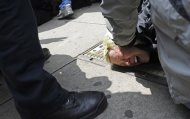http://news.yahoo.com/fbi-treated-occupy-terrorist-group-021450389.html
The FBI Treated Occupy Like a Terrorist Group
By Adam Clark Estes | The Atlantic Wire – Sun, Dec 23, 2012
Now that it's been over a year since the Occupy movement swept across the country, FOIA requests are being fulfilled, revealing uncomfortable details about how authorities viewed the protestors. One such request by the Partnership for Civil Justice came through this weekend, and the 112 heavily redacted pages reveal that theFBI approached the Occupy Wall Street protests as "criminal activity" -- which is not terribly surprising -- and investigated the groups as perpetrators of "domestic terrorism" -- which is fairly unsettling. More specifically, the Feds enlisted its own as well as local terrorism task forces in nine different cities across the country to investigate Occupy. In Memphis, the group was lumped together with Anonymous and theAryan Nation in discussing the threat of "domestic terrorism." White supremacists and 99 Percenters aren't really two groups that we think about hand-in-hand but whatever.
This isn't the first time that a FOIA request has shown the FBI to have engaged in some suspicious activity around the Occupy movement. In September, a FOIA request from the American Civil Liberties Union (ACLU) showed extensive surveillance of the movement's prominent players, leading ACLU attorney Linda Lye to ask, "Why does a political protest amount to a national security threat?" The FBI denied the surveillance accusations by saying that its investigation did not include "unnecessary intrusions into the lives of law-abiding people" and that its prohibited from investigating Americans "solely for the purpose of monitoring activities protected by the First Amendment or the lawful exercise of other rights." Of course, if you classify the actions as "domestic terrorism," other rules apply.
That in mind, we still don't really have any idea how far the FBI went in chasing the Occupiers. At the time of this latest disclosure over two-thirds of the bureau's records on the movement have been made public. As the Partnership for Civil Justice said in a press release, this latest batch of documents is only "the tip of the iceberg."





 BART Board confirmed this morning a policy of shutting down Cellphone Networks to quell dissent. BART was the first agency in the United States to use Chinese Communist, Iranian Theocratic and Mubarak style suppression of free speech to quell protest. As the US Secretary of State has strongly condemned Iran and Egypt for similar communication network shutdowns, Chinese officials were quick to
BART Board confirmed this morning a policy of shutting down Cellphone Networks to quell dissent. BART was the first agency in the United States to use Chinese Communist, Iranian Theocratic and Mubarak style suppression of free speech to quell protest. As the US Secretary of State has strongly condemned Iran and Egypt for similar communication network shutdowns, Chinese officials were quick to 